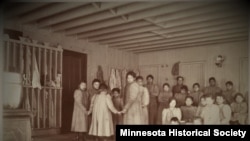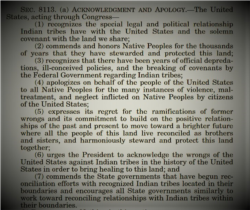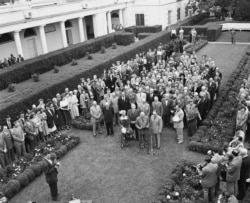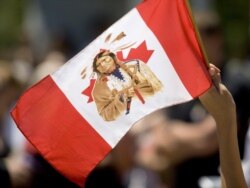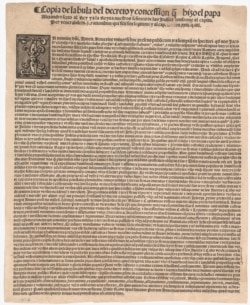Almost every important piece of U.S. legislation contains at least one completely unrelated provision, embedded either as a favor to lawmakers or because it couldn’t pass as a standalone law.
As it was with the 2010 defense appropriations act, H.R. 3326 (now, Public Law 111-118), which contained America’s first apology to Native Americans for historic policies of assimilation and forced removal.
The bill, which passed in the Senate on December 19, 2009, and was signed by then-President Barack Obama the same day, recognizes the legal and political relationship between the U.S. and tribes, acknowledges “years of official depredations, ill-conceived policies, and the breaking of covenants,” and apologizes for violence, maltreatment and neglect.
“The apology covered pretty much what it needed to cover,” said Dr. Negiel Bigpond, a fourth-generation Christian pastor and member of the Euchee (Yuchi) tribe, which was forced into absorption by the Muscogee (Creek) Nation in the late 19th century. For years, he worked with then-Senator Sam Brownback of Kansas to get a joint resolution of apology through Congress.
But he wasn’t satisfied with the way it was issued.
“I didn’t particularly care for its being hidden away in a defense bill. I thought that should stand on its own merits as a bill on its own,” he said.
The provision also urged the president to “acknowledge the wrongs of the United States against Indian tribes in the history of the United States in order to bring healing to this land.”
But Bigpond says that acknowledgment never came and that most Americans have no idea that the apology exists.
He has joined forces with former Senator Brownback to change that. They have launched “The Apology,” calling for the White House to formalize that apology in a Rose Garden ceremony.
To raise public awareness, they are producing a multiple-part film series examining historic injustices against Native Americans, including forced attendance at boarding schools.
Bigpond believes the only way Native Americans can move past historical trauma is for the government to repent this and other wrongs.
Is ‘sorry’ enough?
In its simplest interpersonal form, an apology is an expression of remorse and an acceptance of responsibility for injustice.
But researchers say a government apology needs to go beyond “I’m sorry” in several ways: It should acknowledge the contributions of the victimized minority to society as a whole; it should be worded in a way that is acceptable to those wronged and non-victimized majorities, who may believe the apology implicates them in the injustice. It should also stress the fairness of modern justice systems, as opposed to historic systems that allowed abuses to take place.
Elsa Stamatopoulou believes more than a Rose Garden ceremony is warranted. A former chief of the Secretariat of the United Nations Permanent Forum on Indigenous Issues, she today directs the Indigenous Peoples' Rights Program at Columbia University’s Institute for the Study of Human Rights.
Indigenous peoples have not tried to come up with any formula for a “perfect” apology, Stamatopoulou said. “But it would have to be more than a single moment or event. It has to have a timing and a process that is meaningful for indigenous peoples,” she added, pointing to the example set by Canada.
In 1998, Canada offered a lengthy “Statement of Reconciliation” to First Nations, Inuit and Metis people and announced a $350 million ''healing fund'' for boarding school survivors. But many First Nations people believed this wasn’t enough. Over the next decade, thousands of survivors filed lawsuits against the government and churches.
The resulting settlement agreement not only compensated former students but established a truth and reconciliation commission, allowing them to share their experiences in public hearings.
Several Canadian Church groups have officially rejected the “Doctrine of Discovery” stemming from 14th and 15th century papal decrees that gave European rulers “permission” to seize non-Christian land and enslave indigenous populations.
“An apology needs to have a cathartic function in society as a whole,” said Stamatopoulou. “The dominant – mainstream – society has to understand what happened. And that’s why so many indigenous peoples have sought truth and reconciliation commissions – involving research, hearings, a lot of pain and a lot of publicity.”
Australia and New Zealand have owned up to historic wrongs against their indigenous populations.
As part of a 1997 legal settlement agreement with the Maori people, New Zealand in 1998 apologized for the "suffering and hardship" it caused them through historic land grabs.
And in February 2008, Australia’s then-Prime Minister Kevin Rudd apologized “for the laws and policies … that have inflicted profound grief, suffering and loss on these, our fellow Australians,” in a speech aired on television.
Looking ahead
The U.S. has apologized for several historic wrongs, including interning Japanese Americans during World War II and for overthrowing the Kingdom of Hawaii in 1893.
So, what’s holding the government back from issuing a stronger apology to indigenous Americans?
“I have lived in the U.S. since 1984,” said Greek-born Stamatopoulou. “And the way I see it, this settler-colonial society feels uncomfortable being told, ‘Everything you are enjoying comes from grabbing land from Native Americans and labor from African slaves.’”
She said she is dismayed that Americans know so little about the continued existence, achievements, needs and demands of Native populations. For real reconciliation to take place, she believes non-Natives need educating.
In 2020, then-Congresswoman and citizen of the Laguna Pueblo in New Mexico Deb Haaland introduced legislation calling for the U.S. to establish a truth and reconciliation commission to formally investigate and document the "cultural genocide, assimilation practices, and human rights violations of Indian Boarding Schools in the United States."
Revelations that the remains of hundreds of boarding school students were found in unmarked graves in Canada lent urgency to the matter. In a June Washington Post editorial, Haaland, now U.S. secretary of the interior, cited the Biden administration’s commitment to live up to treaty obligations.
“But that obligation also requires that all Americans listen and learn, that we allow federal boarding school survivors and their families an opportunity to be heard, and that we engage in meaningful tribal consultation to seek justice,” Haaland wrote.




